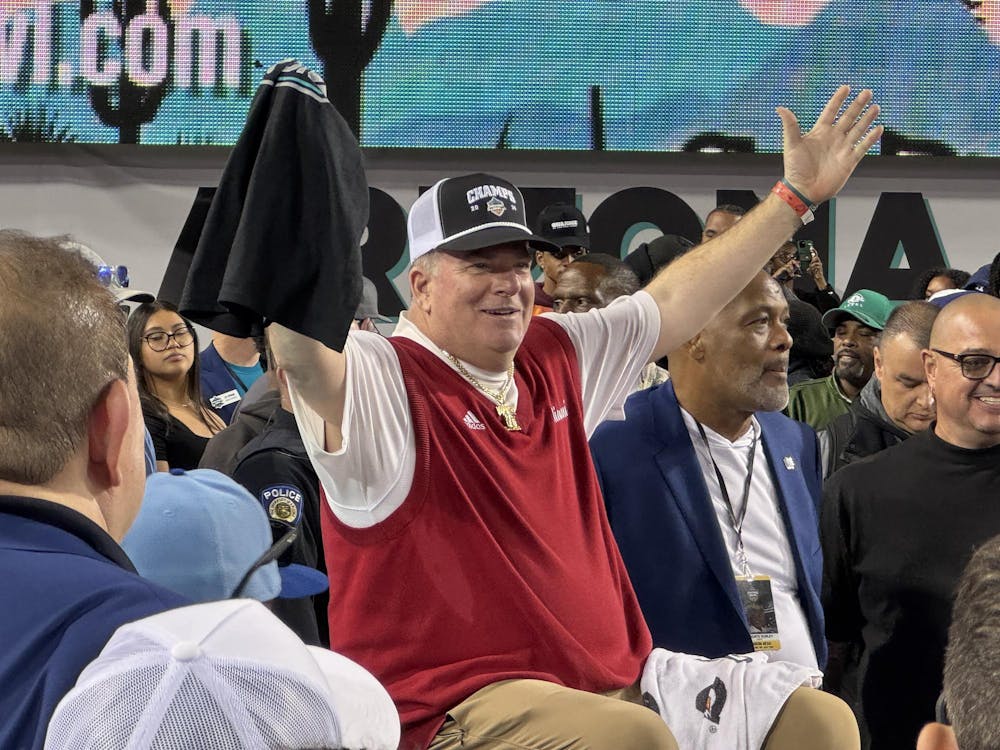On a typical day, Rodney Coates can be found working on his new book, snapping photos of the sunset or writing poetry.
But his true passion is teaching.
Coates has been a professor at Miami University for more than 30 years specializing in critical race theory, ethnic studies and global and intercultural studies. Coates considers himself a “public sociologist” and works to make sociology accessible to everyone.
Before coming to Miami, Coates was a professor at the University of North Carolina at Charlotte and the University of West Georgia. Despite his background in education, though, Coates doesn’t consider himself a teacher.
“To me, it’s the culmination of being a student,” Coates said. “I don’t consider myself to be anything more than a student. [Teaching] allows me to keep on being a student. I don’t really think of myself as a teacher or a professor.”
Growing up, Coates always considered himself a scholar, which contrasted his brother’s athletic talents. His first published paper, “I don’t sing. I don’t dance. I don’t play basketball,” talks about defying stereotypes of Black students.
Coates dedicated himself to learning early in life, but after earning his first F in college, he dropped out and joined the army during the Vietnam War. After the war, he went back to school and earned his Bachelor’s in sociology and urban planning from Southern Illinois University, a Master’s in sociology and anthropology from the University of Illinois and a second Master’s and Ph.D. in sociology from the University of Chicago.
One of Coates’s most popular classes is Critical Race and Ethnic Studies (CRE151) which introduces students to concepts and theories used in the critical study of race and ethnicity. During his time at the University of Chicago, he discovered his passion for critical race theory.
“I was working with some phenomenal scholars, one of which was William Julius Wilson,” Coates said. “His work really spoke to me in ways that a lot of work didn't because he looked at poor people of color in urban areas that we tend to dismiss, and it captured my imagination. There’s somebody that has a critically different interpretation, and I’ve been hooked ever since.”
At Miami, Coates has been active in the community and encouraging interest in education for underrepresented communities. He helped establish the Miami-Cincinnati Scholars program to give full scholarships to underrepresented high school students in the Cincinnati Public School system who wish to pursue an education in STEM.
Recently, he worked with STEM faculty at Miami to win a $2.2 million grant to create pathways for people of color to pursue interests in STEM.
He also co-founded the Bridge Triangulation Program for Miami’s incoming first-year football players. The players take Coates’s Critical Race and Ethnic Studies Class as a way to ease into their college career while training for the football season.
Enjoy what you're reading?
Signup for our newsletter
“Dr. Coates is very driven. He’s a great role model in that regard,” Matt Yoches, director of football operations, said. “He’s a great role model in proving people wrong when they tell you you can’t do something.”
Caleb Shaffer, a junior offensive lineman at Miami, took the class three years ago but still respects Coates as a role model.
“I consider [Dr. Coates] almost a mentor of sorts,” Shaffer said. “We still keep in touch to this day. We always talk about the class, and he tells me about kids who take the class after me. We have an extremely great relationship since I took his class.”
Shaffer, a junior sports management major, says that the Bridge Triangulation Program not only helped him adjust to college, but it also motivated him to do well.
“I was so appreciative of that class,” Shaffer said. “I would say that it was one of the first classes in my academic career that I was excited to learn every day, and my grades reflected that.”
The program is equally valuable to Coates because he gets to share his passion for helping students see the best in themselves.
“We have discovered how to help them to see themselves as scholars, probably for the first time in their lives, and we’ve given them hope in a future where we recognize that less than 2% of college football players or athletes in general make it to the pros,” Coates said.
Although Coates has been teaching for several years already, students like Shaffer hope he sticks around so he can inspire others.
“At the end of the day, we need to create more Dr. Coates to be out here empowering us kids and showing them that, especially Black kids, there’s more potential for you.”




